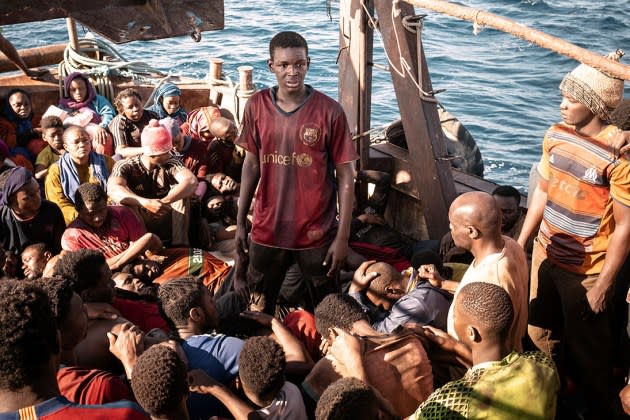‘Io Capitano’ Review: Tragedy and Grace Are Marbled Together in Matteo Garrone’s Moving Migration Drama

Film programming, like history, doesn’t repeat itself but does rhyme. This is proven by the fact that two highly complementary, equally excellent films about immigration, Me Captain (Io Capitano) and Green Border, both landed in competition at this year’s Venice Film Festival.
Agnieszka Holland’s meticulous Green Border offers a polyphonic examination of the plight of refugees trying to enter the EU through Belarus, but also encompasses the views of local Poles to create a panoramic, intellectually rigorous view of the situation. Italian director Matteo Garrone’s emotionally searing but ultimately uplifting epic, on the other hand, confines itself to the experience of Seydou, a 16-year-old boy from Senegal.
More from The Hollywood Reporter
Indelibly played by non-professional Seydou Sarr, offering a remarkably mature performance, he makes his way with his cousin (Moustapha Fall) from their home in West Africa across thousands of miles on a quest to reach Europe. Taking viewers with him every step of the way, it’s a journey that inevitably burns away Seydou’s childish innocence. Garrone, however, almost never puts a foot wrong with this painstakingly composed work, an adventure peppered by moments of nauseating horror but also ravishing beauty and grace.
Working for the first time with cinematographer Paolo Carnera (The White Tiger) and venturing far beyond the Italian settings of most of his features, Garrone (Dogman, Tale of Tales, Gomorrah) circles back here to an exploration of the immigrant experience he first delved into with Land in Between (1996) at the beginning of his career. Only this time, Garrone can command a budget that accommodates a transcontinental shoot, scores of characters and background artists, and challenging sea and desert locations, all of which convey the daunting vastness of the distance traveled. Still, while the landscapes, especially in the parched Sahara section of the story, are dazzling, Carnera’s camera always keeps the focus on the humans, sometimes specks seen from great distances moving through the sand and sometimes studied in close-ups that fill the widescreen canvas.
Outside of Dakar, Senegal’s capital, Seydou is first met waking up in the one-room house where he lives with his widowed mother (Khady Sy) and an uncountable number of little sisters, some of whom are seen dancing ecstatically in a local ceremony at which Seydou plays drums with his cousin Moussa (Fall). Seydou and Moussa have been secretly working on building sites for months to save money for a trip to Europe, where they hope to earn even more and perhaps become hip hop stars so famous that white people will want their autographs. (Sarr is, in fact, a rapper in real life and gets to show off his skills here.)
However, when Seydou tests the waters with his mother and asks what she’d think if he left for Europe, he says it would be to provide money for her and his sisters. Not that it matters to his mom. She flatly forbids him from going, warning that far too many people have died along the way, especially on the boats across the Mediterranean, words of warning that hang ominously in the air.
Although Seydou will defy his mother’s wishes, he and Moussa take time before their departure to ask the local shaman to petition their ancestors for their leave to travel. Fortunately, permission is granted, and after paying a substantial amount of their savings to middlemen — thinking this should cover the whole journey to Europe — they set off on a bus headed west.
They pass through Niger and at one point pick up fake passports. Their savings dwindle and the methods of transportation gradually get less comfortable and secure. The first sign of just how dangerous the journey will be, and how ruthless these traffickers are, comes when a man falls off the flatbed truck they’re all crammed into the back of as the driver races recklessly through the desert. There’s no chance that he’ll stop the truck to pick up the lost man, and it starts to dawn on Seydou that maybe his mother was right after all. (Mothers are always right.)
Many more will be lost throughout the story, including an older woman (Beatrice Gnonko) who can’t go on anymore by the time she, Seydou, Moussa and a gaggle of others are walking on foot across the Sahara. Moussa implores Seydou to leave the dying woman behind so that they don’t lose track of the guide leading them, but the choice haunts Seydou.
Later, he imagines helping her in a sequence involving striking visual effects that could be read as a dream or maybe as events taking place on some astral plane. There’s a porousness here between the everyday world and the spiritual dimension, a haziness that’s often a feature in West African cinema. (See, for instance, 1987 Malian classic Yeelen by Souleymane Cissé or more recently Atlantics by French-Senegalese filmmaker Mati Diop.) But while Seydou suffers immensely on his quest both emotionally and certainly physically, there’s a sense that he did the right thing by asking his ancestors for permission and that they’re looking out for him most of the time.
Even so, Garrone keeps us guessing right up until the very last moment of the film, ratcheting up the suspense skillfully as we wonder just how badly this will go for Seydou. If there is a crumb of hope in the final scenes, that has to be held in balance with the knowledge that there are many stories out there about immigrants that don’t even have that little crumb — and that the next chapter for many migrants will be full of horrors like those seen in Green Border.
Best of The Hollywood Reporter